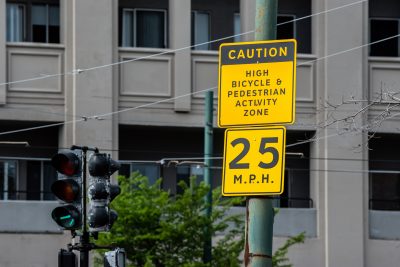Despite a 50 percent decrease in traffic due to the coronavirus pandemic, the rate of fatalities on Massachusetts’ roadways doubled in April, according to the Massachusetts Department of Transportation.
Last month, 28 people died in car crashes statewide, up from 27 people in April 2019.

Jeff Larason, director of the Massachusetts Highway Safety Division, said the fatality rate is compared against the vehicle miles traveled, which he said has decreased as there are currently fewer drivers on the roads.
Larason said less-populated roads have led to increased speeding and is likely a factor in this uptick of deaths.
“People don’t even realize how much faster they’re going,” Larason said, “because they haven’t generally had the opportunity to drive as quickly into Boston on a Monday morning rush hour as they do now.”
Drivers should minimize distractions, drive at the speed limit and wear seat belts to prevent fatal crashes, Larason said. Especially at this time, drivers should be mindful of overstressing the medical system.
“This is a crisis situation where medical personnel are stretched to the max,” Larason said. “We don’t need people to crash because those medical personnel shouldn’t be dealing with you, they should be dealing with the crisis.”
There have been fewer crashes involving pedestrians and cyclists this year, but the risk is still present for these road users, Larason said.
“As people are physical distancing, a lot of people are moving out into the roads to pass other people,” Larason said. “We’re very concerned about making sure that [drivers] are watching out for those vulnerable road users because we think that there’s a higher risk than there has been in the past.”
Brendan Kearney, deputy director of WalkBoston, a pedestrian advocacy group, said one safety solution is blocking off parking lanes for walkers, something that’s already been done in Brookline.
“There’s obviously not a one-size-fits-all solution,” Kearney said. “We think it’s great what Brookline has been doing in Coolidge Corner around the grocery stores and other essential businesses, because right now the sidewalks aren’t wide enough for people to be queuing up outside a store.”
Louisa Gag, public policy director for LivableStreets Alliance, an advocacy group for equitable transportation, said redesigning highways where speeding is a problem may help reduce fatalities.
“The City proposed a plan to do what’s called a ‘road diet’ or a reduction in the number of travel lanes,” Gag said. “So cars can provide more space for the sidewalk and for protected bike lanes.”
Emily Stein, president of Safe Roads Alliance, said the Hands-Free Law, which bans active use of electronic devices while driving, hasn’t been a priority for Massachusetts State Police to enforce amid the pandemic.
“The addiction to our phones is at play here and it is a problem,” Stein said. “The more we see the Hands-Free Law in effect and we see it being enforced, I think that will lead to a positive behavior change.”
Stein said she hopes that people will be more mindful when driving, even once the pandemic is over.
“We cannot operate in a bubble of our cars, and I think too many of us do that,” Stein said. “Hopefully when this pandemic lifts, we’ll be so grateful that we can bring that kindness onto our streets and bring that into our driving behaviors.”




























































































































Snapseed for PC • May 8, 2020 at 7:35 am
thank you for letting us know about this, I think this matter needs to be consider again.
Lexi Matthews • May 7, 2020 at 3:15 am
In the title, it should say “fewer drivers,” not “less drivers.”
Daily Free Press Admin • May 7, 2020 at 12:42 pm
You’re right. Thanks for pointing that out!
– DFP Admin